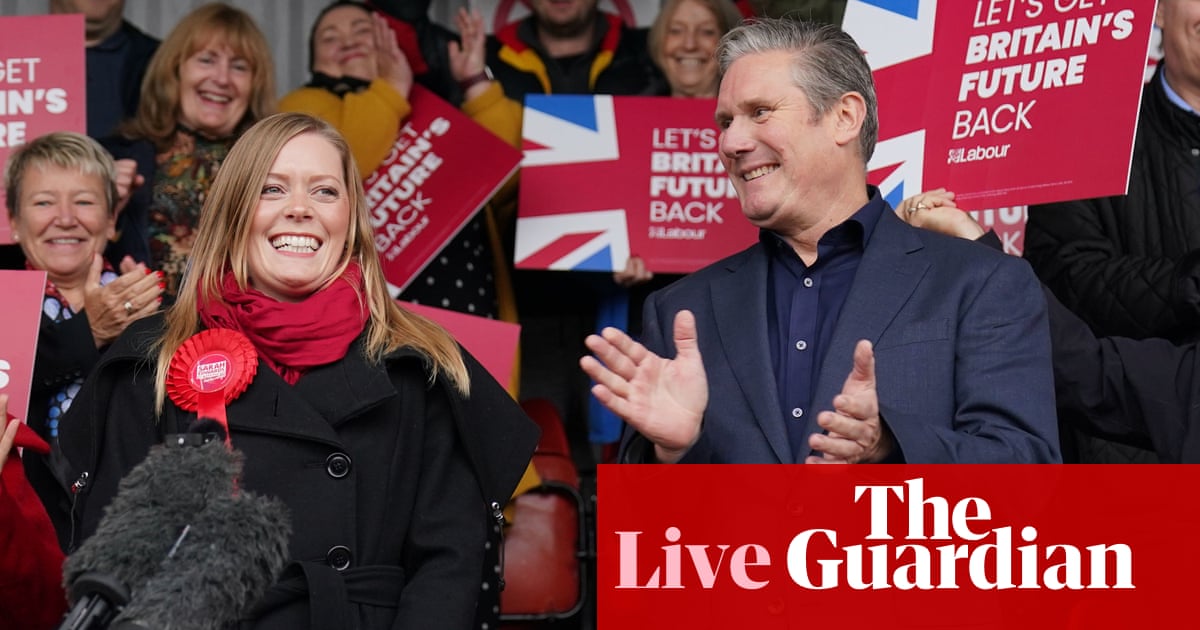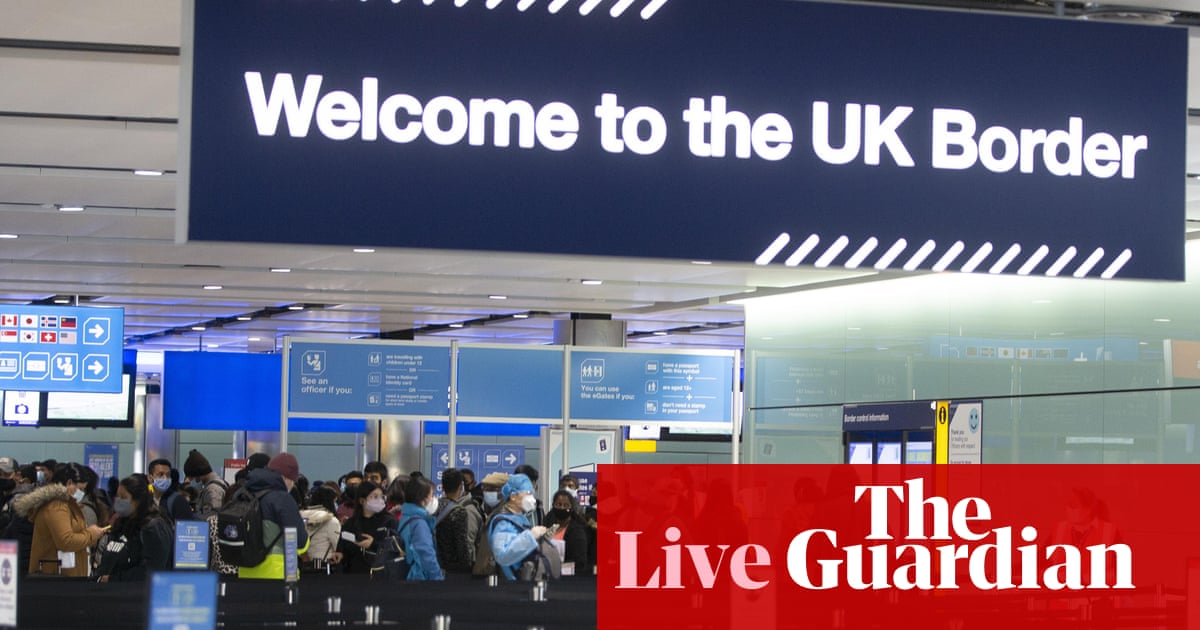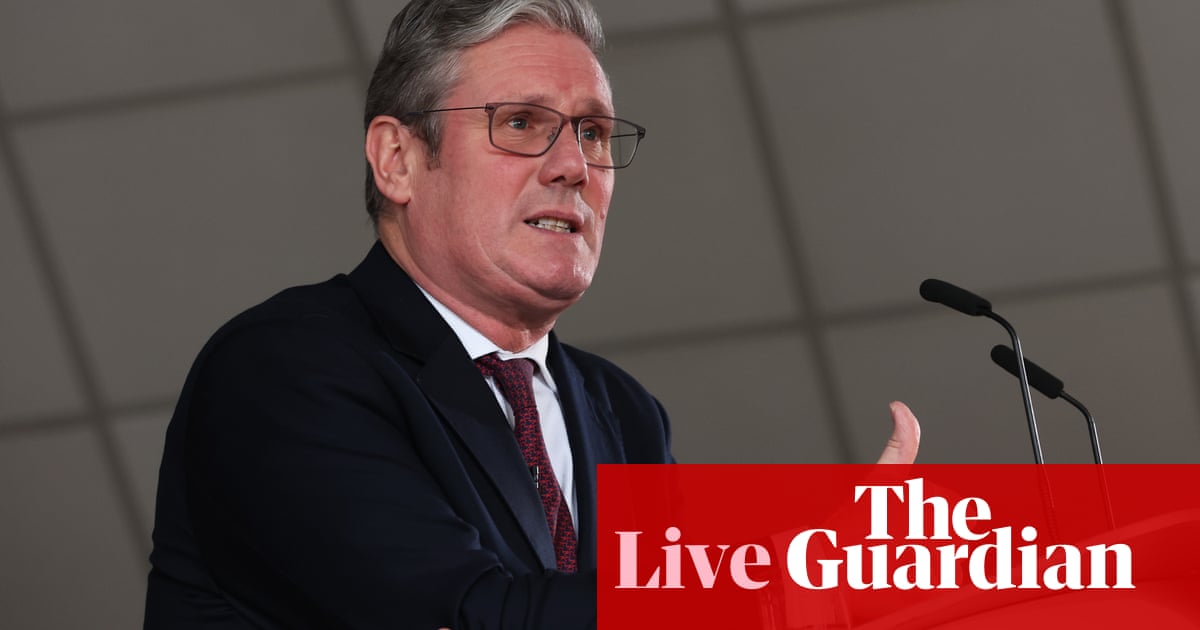
Starmer says byelection results show people "fed up with 13 years of decline" under Tories
Keir Starmer is now in Tamworth where he has been speaking to supporters in the main stand at the Lamb, the home of Tamworth FC. Starmer told them:
People told me that it was not possible to win this seat and this byelection. You absolutely smashed it.
What you have seen here replicates what’s going on across the country – people are fed up to the back teeth with 13 years of decline under this government.
They want a fresh start. They want to go forward.
There were Tory voters yesterday who went to the ballot box to vote Labour. That is because they are fed up with the decline and despairing of the party they used to vote for.
Afternoon summary
Keir Starmer has said that Labour is “redrawing the political map” as he carried out a triumphant tour to the site of two historic overnight byelection wins, as his party overturned huge Conservative majorities in Tamworth and Mid Bedfordshire. And here is an analysis of the results by Lewis Baston.
And here is his conclusion.
The Conservatives have attempted to draw some comfort from the low turnout in the byelections, but the falls were not out of kilter with other recent byelections and, if anything, it makes the collapse in the Conservative vote look worse.
There is no reason to suppose that the abstainers are cheering the government on. They are more likely to be disillusioned with politics, particularly if they put their faith in Brexit in 2016 and Boris Johnson in 2019.
The byelection results are unalloyed good news for Labour. Unless there is a sharp change in the political weather, Labour is on course for a stunning electoral triumph at the next general election, a turnaround unlike anything Britain has seen since the Liberal landslide of 1906.
Rishi Sunak has told broadcasters in Cairo that the Conservative losses in the Tamworth and Mid Bedfordshire byelections were “disappointing” but said there were “local factors at play”.
Rishi Sunak and the Egyptian president, Abdel Fatah al-Sisi, have agreed leaders needed to “avoid a contagion of conflict” in the Middle East. After they met in Cairo earlier today, No 10 said:
The leaders said that the loss of life in Israel and Gaza over the last few days was truly tragic. They agreed that global leaders should do everything possible to avoid a contagion of conflict in the region, and that every effort must be made to stop terrorism and protect civilians.
In electoral politics, the past is not a perfect guide to the future, but it is a lot better than nothing, and much of the commentary today about what we can learn from last night’s byelections has focused on how Labour is doing compared to when it was in opposition in the past, and what that means for the next election.
Rob Ford, a politics professor, has written a good post on his Substack account going into this in more detail, and he has good charts putting the scale of the Labour victories in context.
This one shows Labour’s best byelection wins in terms of swing from the Conservatives since 1945. The light red ones were this year.
And this one shows average government to opposition swing in byelections parliament by parliament since 1945. The two bars on the furthest right (light grey and black) are swings for this parliament, before Partygate and after Partygate.
Ford says:
The latest two smashing wins have pulled Labour’s average swing in “big two” by-elections for the whole Parliament up to 9 points. This is getting close to the swing levels seen in past Parliaments where the opposition went on to win - Margaret Thatcher managed an average swing of 10 points in 1974-79, David Cameron managed 10.9 points in 2005-10 and Ted Heath managed 12.1 points in 1966-70. Starmer is already wel ahead of some general election winners: Harold Wilson managed only 5.5 points in the 1959-64 Parliament, and 4.3 points in 1970-74, while Winston Churchill managed just 4.9 points in 1950-51. Are were well behind Starmer’s current average.
However, we should take seriously the possibility that the first two years of this Parliament were an outlier, with a major pandemic driven “rally round the flag” effect. If we therefore focus instead on by-elections since 2021, the average swing to Labour is 12.4 points, meaning Starmer is now ahead of five of the six opposition leaders who have gone on to win general elections since 1945. He is behind only one - Tony Blair (14.4 point average swing) - and his performances this year have been matching Blair’s best.
The full post is well worth reading. Here is the in a nutshell version.
It is true that Starmer is not at Blair 1994-1997 levels of popularity.
It is not true that he needs to be in order to win.
Every polling and election performance indicator is flashing red for Cons.
And their PM is currently as popular as...Jeremy Corbyn was in December 2019.
Charities that work with asylum seekers have criticised the government’s proposal to consult councils on the number of refugees to be admitted to the UK arriving via safe and legal routes. (See 12.51pm.)
Steve Smith, chief executive of refugee charity Care4Calais, said:
Passing the buck to underfunded councils to justify limiting safe futures is a dereliction of leadership.
If the government was serious about putting people smugglers out of business, stopping small boat crossings and saving lives, they would immediately get on with introducing a safe passage visa for refugees fleeing war, torture and modern slavery to claim asylum in the UK.
And Tim Naor Hilton, chief executive of Refugee Action, said:
The government must not think about caps but a target to resettle at least 30,000 refugees a year as part of a standardised global scheme that can expand to respond quickly to emerging crises, such as in Afghanistan and Ukraine.
No 10 urges people attending pro-Palestinian marches to be "mindful" of fear felt by others
Downing Street has said that pro-Palestine marchers attending demonstrations scheduled to take place around the UK this weekend have a right to protest but should “be mindful” of the “fear and distress felt by many families in this country”.
The comments by a spokesperson for Rishi Sunak are a subtle shift in the government’s tone from last week, when the Foreign Secretary James Cleverly said that there should be a “pause” in such protest in the wake of the October 7 attack on Israeli by Hamas.
At the lobby briefing this morning a Downing Street spokesperson told reporters:
We’re clear that people must remain free to peacefully express their views, and protest is an important part of our democracy, but we also recognise that this is clearly a deeply distressing time for many,.
And we would appeal to everyone across the country and those who are considering joining these protests to be mindful of that - and to consider the fear and distress felt by many families in this country over the distressing events that we’ve seen.
With regard to clamping down on antisemitism and any forms of hatred and abuse, we’re very clear that the police should take the strongest action where they see that and use the full extent of the law to crack down on criminality.
Mandelson says "many" in Labour think they"ve won general election already and that"s "poisonous" for its chances
Under a little-known rule it is now compulsory for all retired frontline politicians to have a podcast, and Lord Mandelson, the former Labour cabinet minister, has just started his. Along with Daniel Finkelstein, the Conservative peer, and Polly Mackenzie, a former aide to Nick Clegg, he is doing a podcast called How To Win An Election with the Times.
In a trailer, that seems to have been recorded before the byelection results came in, he says “many” people in the Labour party think they have won the general election already and that is “poisonous” for the party’s prospects. He says:
One really big issue for the Labour party is that many of them, I’m afraid, really do feel that the election has been won and that is so poisonous. It is so corrosive for a party. I tell you why: because it leads you into traps and mistakes. It makes you feel well, actually, it doesn’t matter if we just make ourselves sort of half better or half appealing or put this policy half right. You know, let’s sort of split the difference between appealing to the public and keeping the party happy. That is such a danger for the Labour party.
The long-running industrial dispute over university staff pensions has come to an end, after 99% of University and College Union (UCU) members voted to accept an offer from employers that reverses previous cuts.
The vote brings to an end the dispute over the Universities Superannuation Scheme (USS), which has been running since 2018.
Jo Grady, the UCU’s general secretary, said:
This is a momentous day, not just for our members, but for workers everywhere. After taking 69 days of strike action in a five-year battle to defend our pensions, we have won and within months university staff will see the UK’s largest private pension scheme fully restore our pensions.
Meanwhile, teachers at sixth-form colleges in England have also voted to accept an offer of a 6.5% pay rise for the majority of staff and an 8.4% increase for those on the lowest pay point.
Byelection results show Sunak needs to be "more robust" in adopting conservative policies, says Danny Kruger
Danny Kruger, who is co-chair of the New Conservatives, a new group for rightwing MPs, told Radio 4’s World at One that the Tories lost last night because their supporters were not voting, not because they had switched to Labour. It is the same argument put by Greg Hands, the party chair (see 7.55am), and Gillian Keegan, the education secretary (see 11.24am).
Kruger said:
The fact is Labour didn’t win these elections. We lost them, unfortunately. And that’s because people who previously backed us decided not to.
So I am very disappointed, and I think it’s a wake-up call for us.
But I’m not downhearted because I think the numbers show that we can still win. We just need to get our people to come out and vote for us.
Since the summer Rishi Sunak has adopted a more combative, rightwing edge, watering down some net zero policies, promising to end the so-called “war on motorists” and not ruling out leaving the European convention on human rights. Some Tories have argued that the byelection results show these moves have not worked (see 11.16am), but Kruger said he drew the opposite conclusion. Sunak needed to be “more robust and braver”, he said. He told the programme:
What people need, if they’re conservative-inclined, if they’re minded to vote for us, if they voted for us before, in order to vote for us again next time they need to know that we’re standing up for their values, their interests, and that we have a coherent, conservative message.
I think the prime minister does have that in many respects, and I’m encouraged by some of the direction of travel that we’ve seen, particularly on net zero on migration. There are other issues as well.
I think we just need to continue in that direction and be more coherent, more robust and braver.
(If you had asked Kruger yesterday what he wanted from Sunak, he would have also said a more robust and braver conservative message. Responses to election defeats are most interesting, and often most perceptive, when they involve a politician saying the opposite of what they previously thought might be right.)
Richard Tice, the Reform UK party leader, says that last night’s byelection results, which saw his party getting more votes than Labour won by in both Tamworth and Mid Bedfordshire, shows Reform UK could have a “significant effect” at the election.
Common sense @reformparty_uk policies gaining traction
We stand everywhere & will have significant effect at General Election
Tories & Labour = two forms of socialism: high tax, high regulation = low growth
He also says he won’t stand down candidates to help the Conservatives, and that Reform UK will be standing in all British constituencies.
Yes I will keep my promise
630 seats
Rishi Sunak met the emir of Qatar, Sheikh Tamim bin Hamad Al-Thani, in Riyadh this morning, on the second day of his tour of the Middle East. In a readout of the meeting, No 10 said they agreed the Hamas attack on Israel was “shocking and tragic”, they stressed the need to avoid escalation and they agreed “on the urgent need to get food, water and medicine to civilians who are suffering” in Gaza.
No 10 also said:
The prime minister thanked Qatar for their efforts to secure the release of hostages taken by Hamas two weeks ago, including British nationals. He said that the UK government would use all the tools at our disposal to support these efforts and end the torment of the victims and their families. The leaders agreed to stay in close contact to continue these efforts.
In a post on X overnight, Luke Tryl also pointed out that, even though Reform UK is a very rightwing party, its voters would not necessarily back the Tories if Reform UK were not on the ballot paper. (See 1.14pm.)
In Tamworth (see 6.48am) and Mid Bedfordshire (see 6.51am) the number of people voting for Reform UK, the new version of the Brexit party (which in effect replaced Ukip, although a rump Ukip still exists) was bigger than the size of the Labour majority, by 57 and 295 respectively. According to Luke Tryl, the director of More in Common UK, which campaigns for a less divisive politics, that is one of several aspects of the results that should worry the Conservatives. He says:
It’s not just that Labour has won two of the safest seats in the country it’s that they have overcome really significant electoral barriers to do so. In Mid Bedfordshire, Labour won despite a split in the anti-Tory vote and in Tamworth they won a seat that voted heavily for Leave in 2016 and also trended away from Labour at an alarming rate since the party last held it in 2005. All of this suggests that the Tories learnt the wrong lesson from the Uxbridge byelection in July and should have instead focused on what happened in Selby.
The Tories will also have a new worry after tonight; the emergence of a split on the right which saw the Reform UK vote larger than the Labour majority in both Tamworth and Mid Bedfordshire. It suggests that, far from dampening support for the populist right, Rishi Sunak’s adopting of rhetoric around ‘the war on motorists’ may instead have boosted those parties.
Byelections aren’t the same as a general election, of course, but from everything we’ve seen in these two huge results the Tories should be very worried indeed. A significant economic recovery and subsequent feel-good factor over the next year is the only hope that could turn their fortunes around – and on this evidence, even that may not be enough.
Home Office opens consultation on how many refugees arriving via legal routes to admit to UK
The Home Office has announced that it is opening a consultation with councils on setting a cap on the number of refugees to be allowed to settle in the UK every year. The Illegal Migration Act is intended to stop anyone arriving in the UK through irregular means from claiming asylum, and it also includes provisions for a cap on the number of refugees to be admitted if they arrive through safe and legal routes.
In its news release, the Home Office claims having a cap will make the safe and legal route option more feasible. It says:
With a clearer picture of the UK’s capacity to welcome refugees, through the cap, the government will be able to redouble efforts to help more people from all over the world to come through safe and legal routes and ensure that commitments made by councils can be met now and in the future. This will create a more sustainable and well-managed system that is fairer and prioritises both local communities and refugees.
The government is consulting local authorities because they end up having to find accommodation for refugees.
The cap will cover people arriving through the UK resettlement scheme (UKRS), the Afghan citizens resettlement scheme (ACRS) and the community sponsorship scheme. But it will not cover people arriving through the Ukraine visa schemes, the Afghan relocation and assistance policy (ARAP), the Hong Kong British national (overseas) route or the mandate scheme.
The Home Office says, after being agreed by parliament, the cap will come into force from January 2025.












